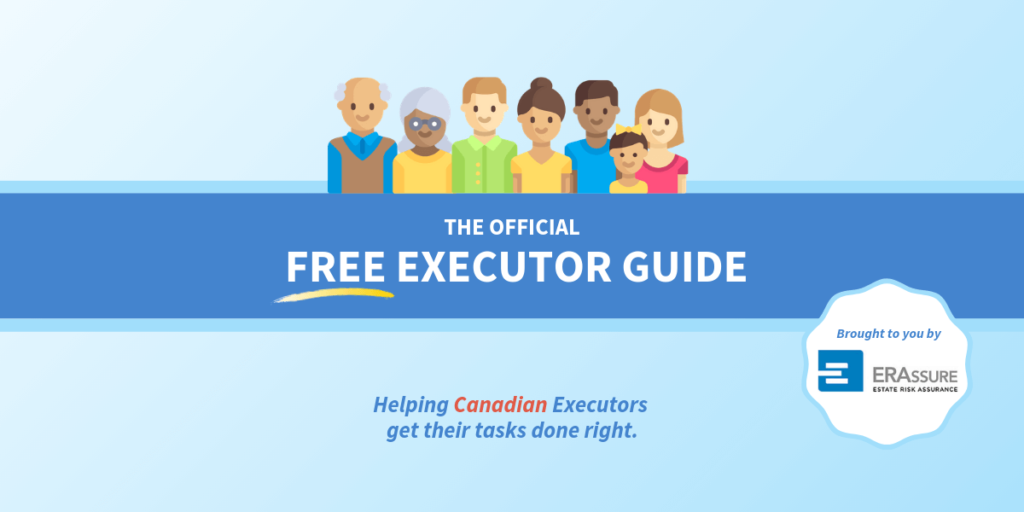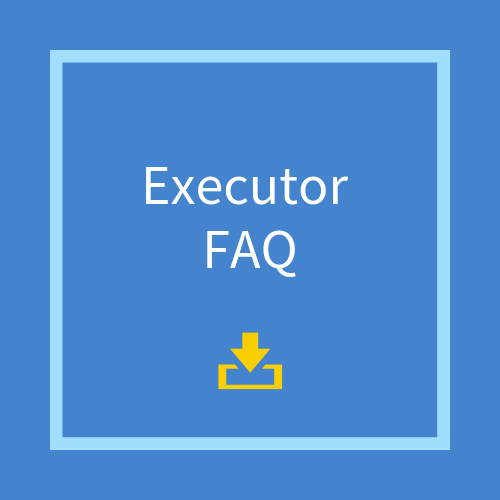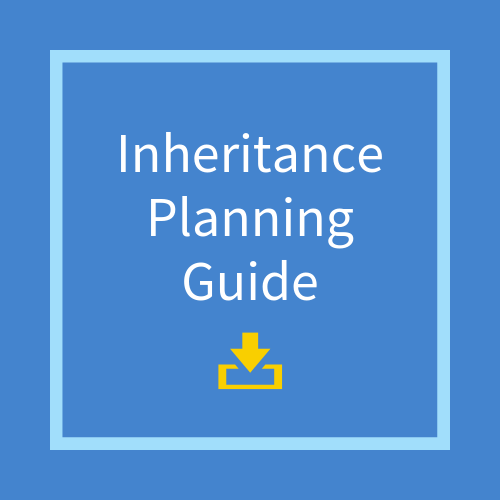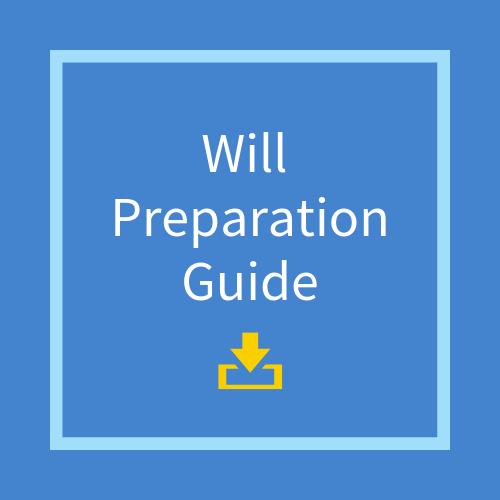Executor of a Will?
Being the Executor of a Will is an important job and we’re here to help you through it. We understand you want to be with family and friends during this difficult time, so we’ve made it as easy as possible for you to complete your Executor tasks.
Keep reading to learn what your role is, the tasks involved, how to prepare yourself, and get step-by-step instructions on how to close the estate correctly.

What is an Executor?

You’ve probably heard that being an Executor is a big job, but what does that mean for you when it comes time to do the work?
You are financially and legally responsible for closing the estate and your liability continues for up to 10 years in Canada.
When closing the estate of someone close to you, whether it’s a parent or a family friend, some responsibilities need to be done right away and others will take more time to complete.
What if I make a mistake?
Accidents happen, even when we have the best intentions.
Many Executors in Canada face disputes over the mismanagement of an estate. They’re typically brought about by beneficiaries, but they can end up costing a lot of money, time, and even relationships.
It leaves a lot of people asking themselves
“how can I protect myself from paying out-of-pocket for disputes?”

Our Team at ERAssure can help you feel safe and confident in your Executor role.
Executor Liability Insurance is for all Canadians who find themselves actively closing an estate and in need of protection.
Your Free Executor Guide
So how can you avoid estate administration mistakes?
Being an executor in this day and age means you have to think of all of the details, including modern tasks like closing social media accounts and selling cryptocurrency.
Save yourself time, money, and a headache by using our free Executor Guide.
Your free official guide includes:
A Step-by-Step Checklist of All Tasks
Required Estate Information Fill-In-The-Blank Template
Important Estate Terminology

Frequently Asked Questions
You probably have questions about your duties and we’re not surprised! It’s a complicated job, but don’t worry, we have the answers you need.
An estate is the total property (both real and personal) that is owned by the deceased immediately prior to death.
The executor is the personal representative of the deceased person and has essentially the same rights, duties and obligations that the deceased person had while they were alive. The executor is able to sue other parties and is the individual that is sued by other parties in respect to issues related to the estate. This may come as a surprise to family members who thought the “estate” is a specific legal entity. If you’re the executor, you have the financial and legal authority to execute the directions of the will.
Any decisions or actions should be made in accordance with the will. An executor is not allowed to decide their own compensation, remove or add a beneficiary, or give away assets of the estate. The executor is personally liable for his or her actions to beneficiaries and creditors for investment losses and breaches of trust, and to other parties with whom the deceased may have had dealings for contractual obligations and wrongs in law.
There can be more than one executor of a will. A very common example of this is multiple children are made executors of a parents estate.The benefit is that the responsibility and financial burden are divided, but joint executors must also co-sign any documents and be in agreement about the will interpretation.
It is up to the executor to seek professional help in reading and interpreting the will, or do it themselves without assistance. If a beneficiary or creditor disputes your interpretation, you are legally and financially liable for the resolution. Assistance with reading the will and other estate administration tasks are included in an Estate Services Plan.
If the executor has passed away before the will-maker, one of three things can happen. 1. Sometimes there is an alternate executor named in the will, at which point they can assume the role or submit an official notice of renunciation. 2. If there is no alternate executor, then the executor of the original executors estate would fill the role. 3. If the original executor did not have a will themselves or their executor is unwilling to take on the role, then you must apply for a grant of administration with will annexed. The courts will then appoint a new person, typically a beneficiary, as the estate administrator.
An executor can spend estate money to cover relevant estate expenses such as funeral services, outstanding rent, out-of-town funeral guest accommodations, or property taxes. They may also have their own expenses related to their executor role covered by the estate. They CANNOT spend estate money on personal items. An executor can also be a beneficiary, but cannot withdraw any inheritance until the appropriate time in the estate closure (i.e. after all debts are paid, probate is granted, and disputes are settled. See the Official Executor Guide for the step-by-step order of tasks.)
Yes they can, however, they will be paying with their own money until they can gain access to the estate’s bank accounts.
If the debt is only in the name of the deceased and there is no money in the estate to pay it off, then the creditor will be obligated to write it off. This is common for consumer debt – for example, Canadians banks write off between 3 – 6% of credit card debt each year. It’s important to note that debts must be paid BEFORE beneficiaries receive any inheritance. If the existing debt was contractual (for example a spouse of the deceased had signed to make it joined debt) then that person would be obligated to pay the balance.
If the will-maker has not made funeral arrangements, the executor is responsible for paying out-of-pocket for the expenses (at least until they gain access to the estate assets, which can sometimes take months.) Many people choose to prepay for their own funeral services as part of their will and estate planning. This is a service that can be included in your Estate Services Plan, too.
Any expenses you incur as part of your role as executor can be billed back to the estate for repayment. This may include compensation for time off work to stage and sell a home or travel and accommodations if the estate is out of town (within reason).
No. An executor is not allowed to give away assets of the estate against the direction of the will. Beneficiaries can, however, dispute how an executor has distributed the estate assets.
Many Canadians choose one or several of their children to act as their Executor. Learn more about how to choose your executor here.
An executor(s) must apply for and be granted probate before gaining access to an estate’s assets, like bank accounts. Until access is given, the executor is responsible for paying any outstanding bills, such as hydro and rent.
Executor Liability Insurance is protection for you against lawsuits that can arise because of estate administration mistakes or a beneficiary dispute. You can apply for it upon becoming an executor, however, it is much simpler to include it in advance as part of an Estate Services Plan.
Traditionally, it was acceptable to use the beneficiaries’ money from the estate to defend and pay for legal actions brought against the estate during administration. Courts today are re-examining the traditional access to estate money in respect to lawsuits; they may impose restrictions or prohibit the executor from using estate money to fund the cost of litigation against the estate. If the executor is determined to be negligent and causes the estate to shrink, he or she may be required to make restitution out of his/her personal assets to the beneficiaries, creditors or other parties that suffered a financial loss.
No, typical home insurance covers injuries and property damage to other parties but does not cover estate administration errors that result in financial loss to other parties.
Given the frequent nature of divorce and remarriage, family law issues that may frustrate the efforts of the executor trying to settle the affairs of the estate are not unusual. Lawsuits arising out of the executor or estate not recognizing or providing for obligations under Family Law are not uncommon.
Maybe not. Withholding money to allow for contingencies may be prudent if you can establish good grounds for doing so. Beneficiaries are not consistently patient with this practice and sometimes take legal issue with it, so it really comes down to your relationship and communication with them.
No, it is common to name one or more charities as a beneficiary. Just be aware that many charities are now much more diligent in their review of executor performance and less likely to forgive any errors that impact the financial value of their bequest.
A growing number of people opt for “Do it Yourself” in an effort to reduce commissions related to real estate or financial investments. DIY activities can cause the estate to lose some or all of the statutory consumer protections which exist at law by using a licensed advisor or real estate agent. This may mean that the estate is exposed to the legal liability risks that arise from these activities – potentially expensive in the case of real estate sales. Follow the Official Executor Guide to help you perform your tasks correctly and on-time and consult a professional when prompted (i.e. when reviewing the will).
The question of when the asset went missing is important. The executor is responsible to protect the assets of the estate, including changing the locks if necessary. Many don’t and the members of the family help themselves because they feel entitled, or believe that Mom or Dad promised an item to them while they were alive. Ultimately this can result in significant problems for the executors, even when the property has no significant value.
The executor is required to not only pay the bills of the estate, but must collect and account for any monies owed to the estate, including loans to the beneficiaries and their families. This is a common source of tension that can result in litigation when such loans, perhaps poorly documented, are required to be withheld from one of the beneficiaries, or collected from their family members.
Maybe not; there are established guidelines that an executor can follow to deal with a bankrupt estate. One risk, however, is that there may be unsatisfied creditors that pursue the executor after the estate has been distributed and the cost of defending yourself in such a case may be a financial burden for the executor.
Late-life will changes and contradicting wills is a common source of estate litigation. The question of her legal capacity makes it a difficult situation, you can learn more about how to resolve late-life will change issues here.
Probably. In the event he can’t be convinced to leave on his own, it may require stronger measures which may end up in litigation at potentially significant cost to all parties. Some of the cost may be allowed to be paid out the estate, but depending on the circumstances, may not be allowed.
Typically a business owner will include what’s called a “Business Succession Plan” in their Will. This includes instructions on what to do with the business in terms of selling, management, financing, investments, staff, and other details.
The size and type of the business makes a huge difference in how you handle it.
🔹 If the business is a corporation, the shares owned by the estate would likely be distributed to the beneficiaries or sold. The Executor may have to make business decisions in the meantime until that transaction is complete.
🔹 If the business is a sole proprietorship, it is likely the Executor will simply sell the assets of the business and close it, unless there is someone who wants to take it over (typically a family member.)
🔹 If the business is an LLC, it will have an operating agreement that includes what should happen in the event an owner dies. When there are multiple owners, they will typically vote to buy-out or replace the deceased member’s ownership. If the deceased was the sole owner of the LLC, it is similar to a sole proprietorship and is typically closed.
🔹 Sometimes a business is gifted to someone in the Will, or it is placed in a Trust and someone is designated to manage it.
There is also the scenario in which no succession plan or Will is left. In that situation, we highly recommend you seek the advice of legal and financial professionals.
Giving out estate items and inheritances is one of the LAST tasks in the estate administration process (which can take up to two years.)
As the Executor, you legally cannot let people take items from the estate until all estate debts have been settled and certain estate administration tasks have been completed.
Timing is important. Losing track of items with real or sentimental value can cause litigation battles. Try to avoid this by giving the beneficiaries regular updates and realistic timelines so they do not grow impatient waiting for their inheritance.
You should also apply for Executor Insurance to protect yourself in case any such litigation issues do come up – then you are not paying out of pocket for legal fees and outcomes.
If you do not have the means to cover the estate bills until probate is granted and you can be repaid, you have two options:
1. You can take out a loan specially designed for this purpose – they do exist.
2. You can ask beneficiaries or family members to help cover expenses until the estate can repay them.
In Ontario, Executors can charge up to 2.5% on both the amounts received and paid out of an estate, for a potential total fee of 5%. In B.C., an Executor can claim no more than 5% of an estate’s gross aggregate value.
So for example, if the value of the estate is $250,000, then theoretically in Ontario the Executor’s compensation would be approximately $12,500.
No. There is only one Executor Fee (see above) and it is split among all of the Executors.
Although you are supposed to manage your father’s finances as part of your duties as Power of Attorney, that does not usually include gifting assets. Even if the will states that you and your siblings are to be the beneficiaries of the estate, you are not yet acting as Executor. Also, debts to the estate need to be settled (among other things) before the estate is distributed to beneficiaries. (See our Executor Guide for full details.) It is safer to avoid gifting a living parent’s assets to avoid potential estate litigation issues in the future.
Feeling lost in estate administration?
Speak to our Team today at 1-855-636-3777 or book your free consultation below
Free Resource Library
Feel free to browse and download any of our free estate planning resources, compliments of our Team at ERAssure.
More Estate Planning Questions?
Who should I choose to be my executor?
Can there be more than one executor of a will?
How can I protect my family and assets?
What is Executor Liability Insurance?
How can I prepare my child to be the executor of my estate?
Is there a preparation course for future executors?
How to Manage Cottage Co-Ownership
Is there a guide for executors?
What are my tasks as an executor?
Can I include my pet in my will?





